News & Stories
2025
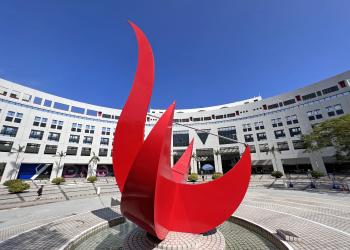
News
HKUST Leads Local Institutions in RAISe+ Scheme with 7 Funded Projects
The Hong Kong University of Science and Technology (HKUST) has emerged as the top-performing local institution in the second round of the Innovation and Technology Commission’s (ITC) Research, Academic and Industry Sectors One-plus (RAISe+) Scheme, securing funding for seven projects. Spanning health and medical sciences, artificial intelligence (AI) and robotics, advanced manufacturing, and electrical and electronic engineering, these projects underscore HKUST’s leadership in transforming pioneering research into real-world applications.

News
HKUST Shanghai Center Showcases Innovative Industry-Academia Breakthroughs at China International Import Expo (Chinese Only)
6月11日至13日,由上海市人民政府主辦的第十一届中國(上海)國際技術進出口交易會(上交會)在上海世博展覽館隆重舉行。香港科技大學上海產教融合中心(港科大上海中心)首次亮相上交會,携其創新研發的自有教育品牌體系「 AHEAD 」及多家生態合作夥伴共同參展,並帶來了港科大6項技術轉移優質項目。
首日,本届上交會以「開放合作:賦能新質生產力與可持續發展」為開幕式主題,正式啓幕。上海市市長龔正出席並啓動本届上交會。港科大上海中心主任楊暘教授、副主任錢文馨及產業負責人于玥出席活動開幕式。
走進港科大上海中心展臺,一場場別開生面的科技對話正在上演。香港科技大學(港科大)派出師生團隊親臨展臺,通過現場演示產品、技術講解和一對一專業諮詢等方式,全方位展示最新科研成果。展臺大屏上循環播放創新案例,將實驗室的前沿科技生動呈現,參會者紛紛駐足觀看,體驗最新研發成果。展臺還特別設有合作洽談區,來自人工智能、生物醫藥等領域的產業代表們與教授們熱切討論,現場交流氣氛熱烈,多個合作意向在此萌芽。
上交會期間,港科大上海中心展位迎來多個重要代表團參觀。上海市商務委員會、上海市政協、共青團上海市委、上海市人力資源與社會保障局、上海市青少年創新創業(模擬)團隊等代表團在港科大上海中心主任楊暘教授、副主任錢文馨及產業負責人于玥等人員的陪同下,深入了解港科大上海中心參展項目及 產教融合培養的模式。上海市漕河涇新興技術開發區發展總公司、上海自由貿易試驗區臨港新片區等區域負責人也向港科大上海中心表達了合作意向,為未來合作開啓無限可能。
6月13日下午,上交會參展項目頒獎儀式在上海世博展覽館圓滿落幕。上海市商務委員會主任朱民、副主任周嵐,東浩蘭生(集團)有限公司副總裁周瑾等領導和嘉賓出席了儀式,並為獲獎項目和單位頒獎。港科大上海中心獲頒第十一届上交會「優秀服務生態機構」獎項。為期三天的上交會圓滿落幕。
港科大教授現場演示 展現產教融合創新成果

News
HKUST Scientists Achieve Breakthrough in Light Manipulation Using Gyromagnetic Zero-Index Metamaterials
The Hong Kong University of Science and Technology (HKUST)-led research team has adopted gyromagnetic double-zero-index metamaterials (GDZIMs) - a new optical extreme-parameter material – and developed a groundbreaking method to control light using GDZIMs. This discovery could revolutionize fields like optical communications, biomedical imaging, and nanotechnology, enabling advances in integrated photonic chips, high-fidelity optical communication, and quantum light sources.
Published in Nature, the study was co-led by Prof. CHAN Che-Ting, Interim Director of the HKUST Jockey Club Institute for Advanced Study and Chair Professor in the Department of Physics, and Dr. ZHANG Ruoyang, Visiting Scholar in the Department of Physics at HKUST.
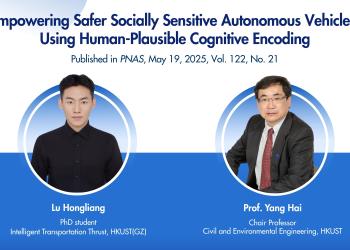
News
HKUST Engineering School Introduces Human-Like Driving Technology for Autonomous Vehicles
Self-driving cars will soon be able to “think” like human drivers under complex traffic environments, thanks to a groundbreaking cognitive encoding framework built by a multidisciplinary research team from the School of Engineering at the Hong Kong University of Science and Technology (HKUST). This innovation significantly enhances the safety of autonomous vehicles (AVs), reducing overall traffic risk by 26.3% and cutting potential harm to high-risk road users such as pedestrians and cyclists by an impressive 51.7%. Even the AVs themselves benefited, with their risk levels lowered by 8.3%, paving the way for a new framework to advance the automation of vehicle safety.
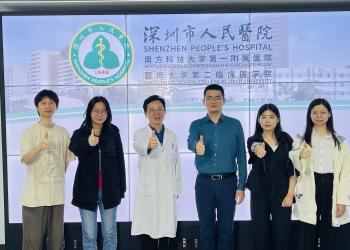
News
Revolutionizing Breast Cancer Diagnosis: HKUST Launches Large AI Model “MOME” for Testing in Over Ten Hospitals
The Hong Kong University of Science and Technology (HKUST) announced today that its School of Engineering researchers have developed Mixture of Modality Experts (MOME), a groundbreaking large artificial intelligence (AI) model for non-invasive breast cancer diagnosis. Trained on the China’s largest multiparametric MRI (mpMRI) breast cancer dataset, MOME achieves expert-level accuracy in classifying tumor malignancy, comparable to that of radiologists with five+years of experience. This innovative solution is now undergoing extensive clinical validation across more than ten hospitals and partner institutions, including Shenzhen People’s Hospital, the Guangzhou First Municipal People's Hospital, and Yunnan Cancer Center, to validate its effectiveness and ensure real-world applicability.
Harnesses China’s largest mpMRI Dataset
![Caption: A schematic of the catalytic enantioselective type II [5 + 2] cycloaddition method.](/sites/default/files/styles/hkust_new_thumbnail_350_250/public/news/10829/0604%20CHEM_0.png?itok=UuvUIYWw)
News
HKUST Chemists Innovate in the Synthesis of Chiral Bridged Polycyclic Compounds
A Hong Kong University of Science and Technology (HKUST) research team led by Prof. SUN Jianwei and Prof. LIN Zhenyang from the Department of Chemistry has developed a catalytic enantioselective type II [5 + 2] cycloaddition method to address the challenges of synthesizing chiral bridged polycyclic structures, particularly those with a bridged seven-membered subunit. This innovative approach utilizes 3-oxidopyrylium ylides to create the desired complex shapes, paving the way for more applications in the rapid synthesis and diversification of other valuable complex molecules, including important natural products and drug molecules.
Chiral bridged polycyclic structures, particularly those bearing a bridged seven-membered subunit, represent a complex and intriguing molecular architecture found in many natural and biologically significant compounds. However, synthesizing these structures has posed substantial challenges for chemists.
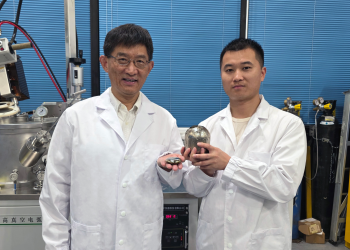
News
HKUST Discovers Novel Elastic Alloy Achieving 20x Temperature Change and 90% Carnot Efficiency in Solid-State Heat Pumping
Researchers at the School of Engineering of the Hong Kong University of Science and Technology (HKUST) have developed a novel elastic alloy called Ti₇₈Nb₂₂, which achieves remarkable efficiency for solid-state heat pumping and exhibits a reversible temperature change (ΔT) ability that is 20 times greater than that of conventional metals when stretched or compressed, offering a promising green alternative to traditional vapor-compression heating and cooling technologies.
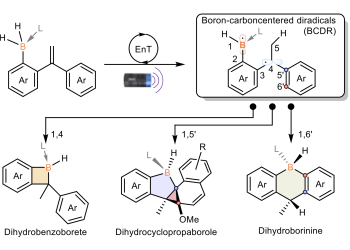
News
Unveiling Boracycles: HKUST Chemists Develop a New Approach to Synthesizing Strained Boracycles
Boracycles are important functional scaffolds, finding increasing applications in catalysis, synthesis, materials science, and pharmaceuticals. However, current studies predominantly focus on three-, five-, and six-membered boracycles, leaving four-membered boracycles largely unexplored. A research team led by Prof. QUAN Yangjian and Prof. LIN Zhenyang from the Department of Chemistry at the Hong Kong University of Science and Technology (HKUST), in collaboration with Prof. LYU Hairong from The Chinese University of Hong Kong (CUHK), has made a breakthrough in developing an efficient synthetic approach to four-membered boracycles. This advancement enables the facile synthesis of other previously inaccessible boracycles, which may lead to valuable applications.








